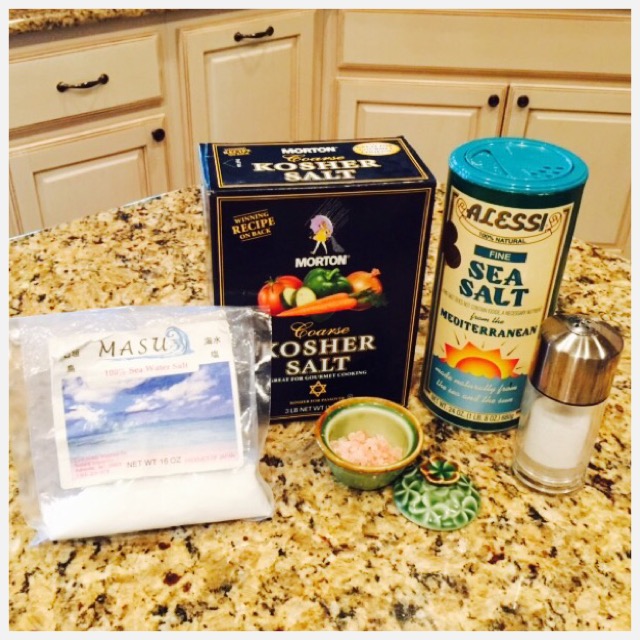I have noticed many products lately that tout sea salt on the packaging. Popcorn with sea salt, tortilla chips with sea salt, salted caramels with sea salt, and even chocolate with sea salt – all leap off the shelves with their eye-catching marketing and magnetizing draw of being mysteriously superior to the other products next to them. You know, the ones that only have table salt in them?
I love salt. Most people do. Along with sugar and fat, it is among the trifecta of most important ingredients that draws people back for more. Crunchy, warm, salty popcorn. Crispy potato chips. White chocolate covered pretzels. Frothy, creamy, delectable hot chocolate with whipped cream, caramel drizzle and a smattering of salt on top. Gah! I love the punch that salt gives. But when it’s sea salt – doesn’t that make it even healthier for you? With its smattering of trace minerals and no stripping of its inherent goodness, isn’t sea salt the best of all salts???
On a trip once, my husband and I ate at a gourmet, farm-to-table restaurant. One of the appetizers was bread and crackers, olive oil and a selection of salts from around the world. One salt was yellow in color and had a slight sulphury taste that was rumored to be a great accompaniment to eggs. Another was gray in color and was taken from salt fields in France. Yet another had pink crystals from the Himalayas. And a final option was dark in color and was taken from a site near a black volcano. Each salt had a different subtle flavor. All of them were fun to try. But I wondered, are these salts truly superior?
From doing some research, I learned that sea salts indeed have small amounts of trace minerals. Sodium and chloride make up the basic elements of salt. But magnesium, calcium, potassium, sulphur, phosphorus, bromine, boron, zinc, iron, manganese, copper and silicon are also found in sea salt and are key components to the manufacturing of enzymes within the human body. Sea salt is indeed vastly superior to the stripped, white table salt that most Americans eat.
Except for one thing… IODINE!
Table salt has been fortified with iodine to help your thyroid function properly. The Recommended Daily Allowance (RDA) for iodine is 150 micrograms for everybody over the age of 14. The RDA for children ages 1-8 is 90/mcg, and for ages 9-13 is 120/mcg. If you’re pregnant or breastfeeding, it is recommended that you get 290/mcg every day. Iodine is found in sea vegetables such as kelp, nori, wakame, and kombu (I know, you probably haven’t heard of most of those, let alone eat them everyday). Iodine is also found in cranberries, organic yogurt, organic cheeses, organic strawberries, and organic potatoes. But until table salt was fortified with iodine in the 1920’s, many people suffered from goiters because of iodine deficiency. Goiters occur when there is a large swelling of the neck due to an enlarged thyroid gland. Depending on the region you lived in and what minerals were in the soil, some people obtained enough iodine naturally while others suffered with thyroid issues without knowing why.
Today, fortified table salt is widely available and most certainly overused in pre-packaged products and fast food. But because of the trend towards sea salt, many people now use only this type of salt to cook and season their food. Realize that if you are one of these people, you may not be getting enough iodine in your diet. Comparing apples to apples, sea salt is a much better option over the stripped and processed white table salt you find in shakers everywhere, to be sure. But make sure your daily vitamin has at least 150 mcg of iodine as a back up plan. If you don’t, you may find yourself feeling depressed, sluggish, and gaining weight – and have no clue as to why.
Iodine is your friend. Make sure you are getting enough in your daily diet and not ignoring this precious resource.
Wishing you the best of health!
Wanda


I’m so glad you wrote about this. For over a decade, I followed a diet that I believed to be the healthiest possible: mostly vegetarian, very low fat, low glycemic, lots of whole wheat, and only sea salt. And of course, my health fell apart. With all my heart I wish that someone along the way had educated me about the dangers of sea salt and the need to replace the iodine in my diet. My blood iodine levels were literally NOTHING…nada, zero, none. And my thyroid is completely crashed and has caused many health problems that impact my daily life.